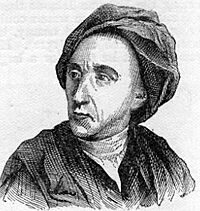The Dunciad facts for kids

The Dunciad (pronounced DUN-see-ad) is a famous, long poem by Alexander Pope. It's a special kind of poem called a mock-heroic poem. This means it uses the serious style of epic poems (like stories about ancient heroes) to make fun of something. Pope wrote it to make fun of bad writers and silly ideas in his time.
The poem tells the story of a goddess named Dulness. She represents dullness, stupidity, and bad taste. The poem follows her chosen helpers as they try to spread these things across Great Britain.
Contents
Different Versions of The Dunciad
The Dunciad was published in a few different versions over time. This shows how Pope kept working on and changing his poem.
The First Editions
The very first version came out in 1728. It was published without Pope's name on it, and it had three parts, or "books." A slightly updated version, called the Dunciad Variorum, came out in 1729.
The Final Version
Later, in 1742, a new fourth book was added. This new part was like a sequel to the first three. Finally, in 1743, Pope released The Dunciad in Four Books. This was the most complete version. It had updated versions of the first three books and the new fourth book. In this final version, a new character named Bays took the place of an earlier character, Theobald, as the main "hero" of the poem.
Where Did the Idea for The Dunciad Come From?
Alexander Pope got the idea for The Dunciad from a few different places. He wanted to write a poem that made fun of dullness and bad writers.
The Scriblerus Club
Pope was part of a group of writers called the Scriblerus Club. This group included famous authors like Jonathan Swift and John Gay. They often met and wrote together between 1710 and 1714. One of their big ideas was to write a funny book about a made-up person named Martin Scriblerus. This book would make fun of silly mistakes and bad ideas in learning. The Memoirs of Martin Scriblerus was one of their projects.
John Dryden's Influence
Another big inspiration for The Dunciad was a poem called MacFlecknoe by John Dryden. This was also a mock-heroic poem. In MacFlecknoe, Dryden made fun of a poet named Thomas Shadwell, calling him the dullest poet of his time. Shadwell was shown as the favorite of the goddess Dulness.
Pope took this idea of Dulness fighting against reason and light. He made his poem a full parody of a famous epic poem called the Aeneid. The Dunciad shows a war of ignorance. Pope chose different people to be the main "champions" of dullness in his poem. In the earlier versions, it was Lewis Theobald. In the later versions, it was Colley Cibber.
 | Frances Mary Albrier |
 | Whitney Young |
 | Muhammad Ali |

